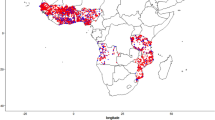Abstract
The Systemwide Initiative on Malaria and Agriculture (SIMA) is an initiative of international agricultural research centers to promote research and capacity building on the links between malaria and agriculture and to validate innovative interventions that would strengthen and complement existing malaria-control strategies in clearly defined settings. Knowledge regarding the nature and dynamics of agroecosystems is particularly needed for the purpose of developing appropriate farmer-managed preventive measures against malaria. SIMA research aims to make use of new and existing information on biomedical and socioeconomic determinants of malaria risks in formulating and evaluating the feasibility of integrated strategies. The initiative is especially interested and proactive in promoting and facilitating transdisciplinary and participatory research in relation to malaria. The convening institute for SIMA is the International Water Management Institute at its Africa Regional Office in Pretoria, South Africa. This article outlines SIMA’s objectives and scope of activities and also highlights achievements, challenges, and opportunities for future collaboration.
Similar content being viewed by others
References
MH Birley (1995) The Health Impact Assessment of Development Projects HMSO London
Consultative Group on International Agricultural Research (2004) CGIAR online. Available: http://www.cgiar.org[accessed 5 September 2004]
C Dakubo (2004) ArticleTitleEcosystem approach to community health planning in Ghana EcoHealth 1 50–59
G Forget J Lebel (2001) ArticleTitleAn ecosystem approach to human health International Journal of Occupational and Environmental Health 7 IssueID2 Suppl S3–S36
JL Gallup JD Sachs (1998) The Economic Burden of Malaria Centre for International Development at Harvard University Cambridge, MA
C Goodman (2000) An overview of economics of malaria Malaria Control in Africa The ENRECA Health Network, Institute of Public health Copenhagen 132–126
JN Ijumba SW Lindsay (2001) ArticleTitleImpact of irrigation on malaria in Africa: paddies paradox Medical and Veterinary Entomology 15 1–11
LA Lacey CM Lacey (1990) ArticleTitleThe medical importance of riceland mosquitoes and their control using alternatives to chemical insecticides Journal of the American Mosquito Control Association 6 1–93
J Lebel (2003) Health: An Ecosystem Approach International Development Research Centre Ottawa, Canada
CM Mutero C Kabutha V Kimani L Kabuage G Gitau J Ssennyonga et al. (2004) ArticleTitleA transdisciplinary perspective of the links between malaria and agroecosystems in Kenya Acta Tropica 89 171–186
SC Shannon (2003) Measuring Impacts of HIV/AIDS on Rural Livelihoods and Food Security Food and Agriculture Organization Rome
InstitutionalAuthorNameWorld Health Organization (1982) Manual on Environmental Management for Mosquito Control, with Special Emphasis on Malaria Vectors (WHO Offset Publications, No. 66) World Health Organization Geneva
InstitutionalAuthorNameWorld Health Organization (1986) Intersectoral Action for Health: The Role of Intersectoral Cooperation in National Strategies for Health for All World Health Organization Geneva
InstitutionalAuthorNameWorld Health Organization (2000) WHO Expert Committee on Malaria, Twentieth Report World Health Organization Geneva
Acknowledgments
The authors thank the many individuals and organizations who have participated in various activities that have led to SIMA’s achieving remarkable progress within 3 years of its launching. Some members of the Interim Steering Committee from 2001 to 2002 were from the following CGIAR centers: International Water Management Institute, International Livestock Research Institute, International Institute of Tropical Agriculture, West Africa Rice Development Association, and International Plant Genetic Resources Institute. Other members were from the former International Service for National Agricultural Research; the International Centre of Insect Physiology and Ecology; the University Lake Kariba Research Station, Zimbabwe; and the Danish Bilharziasis Laboratory. We are particularly grateful to the following partners for both financial and technical support: Canadian International Development Research Centre, African Development Bank, Netherlands Government, World Bank, United States Agency for International Development, and Environmental Health Project. The International Water Management Institute Regional Director for Africa, Dr. Doug Merrey, has kindly provided wise counsel to SIMA since its inception.
Author information
Authors and Affiliations
Corresponding author
Rights and permissions
About this article
Cite this article
Mutero, C.M., Amerasinghe, F., Boelee, E. et al. Systemwide Initiative on Malaria and Agriculture: AnInnovative Framework for Research and Capacity Building. EcoHealth 2, 11–16 (2005). https://doi.org/10.1007/s10393-004-0088-4
Published:
Issue Date:
DOI: https://doi.org/10.1007/s10393-004-0088-4




